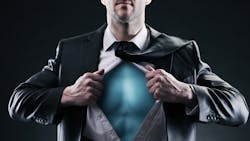My father frequently told me who his heroes were when he was growing up. Since he was just reaching puberty during the World War II years, many of his heroes were military leaders of that era. When he did chores or yard work, he would talk about segmenting out the area to be worked and he'd view it as parts of Asia or Europe to be conquered. The pieces that never seemed to get finished were either North Korea or Vietnam. Such was the history during his lifetime.
Thanks to television the heroes of my youth were predominantly fictional larger-than-life characters from television shows. The Lone Ranger and Captain Kirk are still on my list. Then I discovered books and Spenser stepped in as well. Just recently I spent time in the company of a lot of men and women that I'd call heroes—and what they do is so mundanely spectacular that they do it every day and never look back.
I remember being a kid and seeing the Washington Post comics section that had a full page each Sunday dedicated to a player on the Washington Redskins (now the Commanders). That was back in the day of "The Hogs" and there they were each week. Were they heroes? Not just for playing football.
Sure, sports figures can be heroes, but I argue whether they are heroes simply because they excel at a given sport. Quite often they are looked up to, admired and envied because they make lots of money, get to be on television and have trading cards made with their picture on them. None of that makes a person a hero. So what does?
There are two definitions offered by dictionary.com that I'd like to use in this discussion:
- Hero: a man of distinguished courage or ability, admired for his brave deeds and noble qualities.
- Hero: a person who, in the opinion of others, has heroic qualities or has performed a heroic act and is regarded as a model or ideal.
Let's look at that first definition. "...a man of distinguished courage or ability." Professional sportsmen definitely have distinguished abilities as they excel in a field where others don't. However, the second part of that is, "...admired for his brave deeds and noble qualities." Playing professional sports makes a man neither brave nor noble so I don't see how this definition could apply.
Moving on to the second definition, we find something that might apply to sports figures, but not for their athletic capabilities. Paraphrasing parts together, how about "a person who... has heroic qualities... and is regarded as a model or ideal." Outside of the sports arena, the professional athlete may well have heroic qualities that make him or her a role model or representative of an ideal. In that light, then yes, there are professional athletes who are heroes. Certainly not every one of them is. It seems like every other month or so we see news about a sports player being arrested for drugs, guns, dog fighting, etc. Those men aren't heroes. They are men with a talent that they've leveraged into a comfortable lifestyle and then dishonored by living a life without respect for other people or for some segment of the law.
What other people might those definitions apply to? The huge majority of police officers, sheriffs' deputies, firefighters, paramedics, and rescuers are heroes in my book. In fact, they fit both definitions provided above. Daily, somewhere in our country, some member of the public safety family displays courage and ability, performing brave deeds and displaying noble qualities. Each day, somewhere in our country, a public safety worker performs an act of heroism, and is regarded as the model or ideal for whatever job he or she) is performing.
Why is it then that when you ask a child who their hero is you rarely get an answer that involves public safety? Depending on the child's age, the most common answers are either their parents, a relative, or a professional sports figure. As the kids get older, unfortunately, some will start naming "gangsta rappas," singers, beauty models, and other popular figures as their heroes. Those people embody something that a child wants to have or emulate as they grow up. Such circumstances strike me as just so sad.
Let me end with this short story:
When I wrote this, I attended Police Week in Washington, D.C., not long before. I was there Wednesday evening during the Candlelight Vigil and was honored to be part of a team that live-streamed the Vigil over the Internet so that those who couldn't attend could still experience it. Several times I referred to the tech folks as "miracle workers" because they did such a good job and made it look so easy. One gentlemen—one of the technical folks I don't know so well—heard me say that and stopped what he was doing. He corrected me. He said, "No. Those people out there (he pointed around the Memorial at all the cops and their families) are the real miracle workers."
Is there a way we can instill that outlook in our children? It's the challenge we face. Are you up to it?
About the Author
Lt. Frank Borelli (ret), Editorial Director
Editorial Director
Lt. Frank Borelli is the Editorial Director for the Officer Media Group. Frank brings 20+ years of writing and editing experience in addition to 40 years of law enforcement operations, administration and training experience to the team.
Frank has had numerous books published which are available on Amazon.com, BarnesAndNoble.com, and other major retail outlets.
If you have any comments or questions, you can contact him via email at [email protected].

